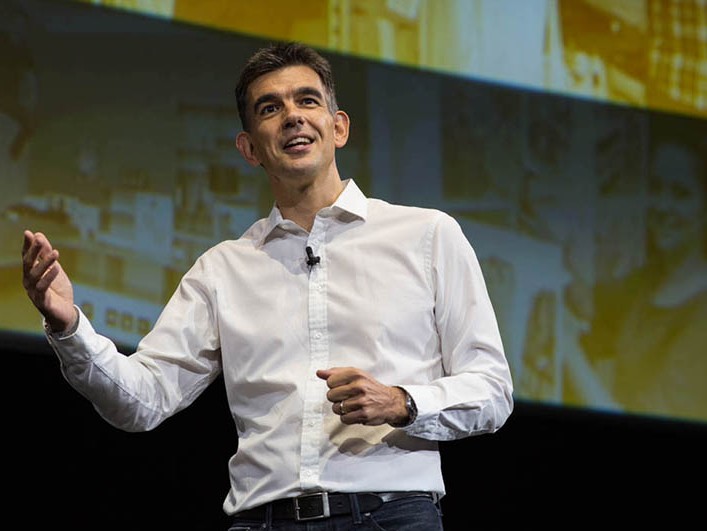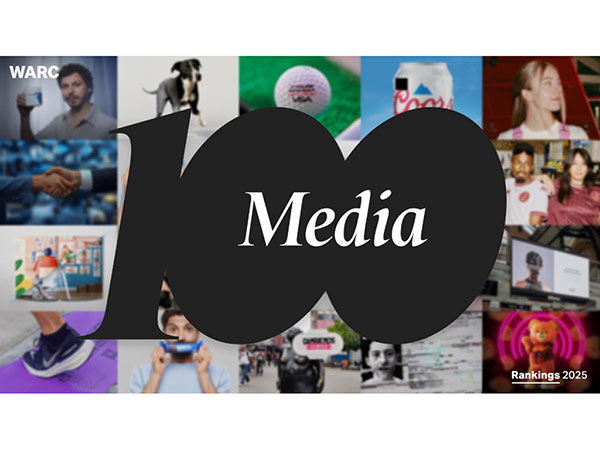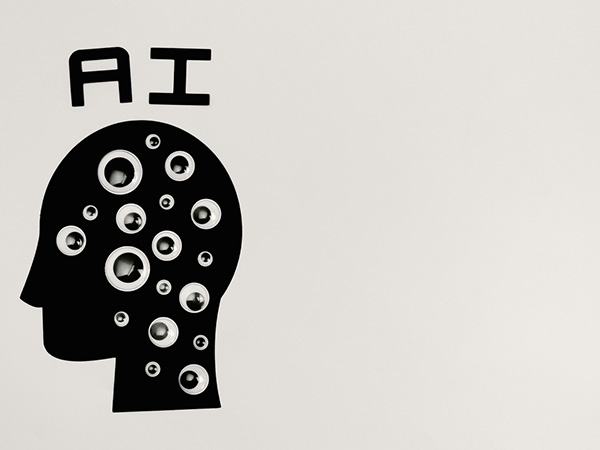News - Digital/Tech
Is Google a force for good?
by Iain Akerman
December 15, 2017

“In my office I’ve got a set of computers that I either used to own or would’ve aspired to own if I had the cash at the time,” says Matt Brittin, Google’s head of Europe, the Middle East and Africa. We are sitting in a boardroom at the tech giant’s European headquarters in Dublin discussing susceptibility to obsolescence.
There’s a ZX Spectrum, a BBC Micro and an old Commodore, he says. Even an antiquated Amstrad. None of which will mean anything to anyone unless they’re of a certain age or interested in the history of the personal computer. (Commodore, with sales of $49 million in 1983, was one of the world’s largest personal computer manufacturers, and yet went bankrupt in 1994.)
“People overestimate the fact that what’s happening today is going to continue, and they underestimate the pace at which something can get to scale today. It’s faster than it’s ever been.”
“There is a history of technology companies that slowed down their rate of innovation and fell by the wayside,” says Brittin, who is president of EMEA business and operations at Google. “So when people talk about the prominent technology companies of today and you go back five years, that’s not the same list. If you go back 10 years it’s a very different list, and I’m sure if you go forward five or 10 years you’ll find that we won’t all be around in the same form because it’s incredibly competitive.
“People overestimate the fact that what’s happening today is going to continue, and they underestimate the pace at which something can get to scale today. It’s faster than it’s ever been. If you think about this: if you’ve got three billion or four billion people with smartphones and you build one app… you can become a global sensation instantly. And that was never possible before.
“That’s both incredibly exciting and quite threatening for the incumbent industries that have built up large armies of A&R people to go and find this talent.”
Apart from the global backlash against tech companies, remaining innovative is one of Google’s greatest challenges. How do you keep building products that millions or billions of people want to use? How do you stay ahead of the technological curve? As the past has shown, consumers are fickle and negative sentiment bites deep.
“It’s not easy,” admits Brittin. “And it’s not easy to do at the scale that we’ve got to now. If you work for a larger organisation, things become more complicated. You can get more conservative, you can get bogged down with internal process, and that’s not necessarily the way to drive innovation.”
It’s one of the reasons why Alphabet was introduced as a holding company in 2015, with dedicated research companies such as DeepMind and Verily separated from Google. It’s also one of the reasons why Brittin keeps a keen eye on key trends.
A former Olympic rower and one-time director of strategy and digital at Trinity Mirror, Brittin strikes an imposing figure. Tall, athletic and incredibly well media trained (he never really gives anything away), his demeanour is simultaneously intimidating and disconcertingly upbeat.
Perhaps because he’s used to being in the public eye. Extremist content, brand safety, corporate tax avoidance – he’s publicly faced questioning over it all. Now, in light of Russian interference in the 2016 US election and the recent Senate committee hearings in Washington, it’s all about politics.
For the time being, however, Brittin is talking trends: the ongoing explosion of access (“This probably dominates everything we’re thinking”); progress within the realm of machine learning; and how people themselves are learning and publishing in new ways.
“Take voice or translation for example,” he says, discussing advances in machine learning. “We can now use fewer data points to more accurately recognise from your voice what you’re saying. That means that we can make brilliant technology available on the lower-end device, using less data with less memory and storage. So the dream of being able to make brilliant technology available for everyone comes one step closer, because smart technology means better tools for everyone, fewer data points, less data cost, less device cost.”
Each of these trends, however, comes with its own challenges, especially the creation of content and the ability to self-publish. For example, Brittin admits ‘bad actors’ have been attempting to use Google’s systems and platforms for ‘bad purposes’ and have been trying to do so for some time. This was particularly true in relation to Russia’s suspected interference in the 2016 US presidential election.
The tech company admitted during recent Senate committee hearings in Washington that the Kremlin-linked Internet Research Agency spent $4,700 on advertising as part of a misinformation campaign during the election. It also revealed that 1,108 Russian-linked videos uploaded to YouTube generated 309,000 views in the US.
Although Google has since launched initiatives to provide increased transparency and enhance security in light of the revelations, Google’s reputation has been undermined, with Brittin admitting more needs to be done.
“Any misrepresentation is bad and we have continued to look at how we can improve our policies and transparency,” he says. “Any time there’s [an] electoral process we really want to make sure that our role in that is clean and legitimate and supportive in all of the things that you would expect. And we work hard to do that.
“We’ve constantly tried to put in place policies and controls and verifications to try to stop that from happening. We’ve made some good progress and we obviously need to do more.”
The furore over political ads, however, is far from Google’s only problem. Concerns over privacy, tax evasion, ad fraud and brand safety have shadowed the company over the past few years. In March, for example, Brittin had to issue an apology to the advertising industry after brands found their ads appearing next to controversial content on YouTube.
Google was also fined $2.85 billion by the European Union in June for abusing its near-monopoly in online search to “give illegal advantage” to its own shopping service. In September it launched an appeal against the ruling.
It is because of these issues that journalists from the EMEA region were invited to Dublin, as much to help assuage fears over privacy, fake news, ad fraud and brand safety as to obtain genuine insight into the company’s activity and behaviour.
For example, during a day of presentations, Google said it took down 1.7 billion ads in 2016 for violating its advertising policies, a figure that represents double the amount taken down in 2015. It also removed over 100,000 publishers from AdSense and expanded its inappropriate content policy to include dangerous and derogatory content. It is also using artificial intelligence and machine learning tools to better detect suspicious content.
Meanwhile, projects such as the Digital News Initiative, a partnership between Google and publishers in Europe, are supporting high-quality journalism through technology and innovation. Amanda Storey, director of EMEA Partnerships at Google, also stated that $11 billion in advertising revenue was paid out to publishers last year, while 10 billion clicks a month go through to publishers’ websites.
Yet all of this can’t hide the fact that a deep apprehension and suspicion of Google remains. In the eyes of many it has become too big and too powerful, although the brunt of the tech backlash has been levelled at Facebook.
Google is expected to take home nearly 41 per cent of the US’s $83 billion online advertising spend alone this year, according to research firm eMarketer, while it’s global dominance of search threatens the concept of fair competition.
“People say ‘you guys aren’t regulated’, but that’s nonsense. In every country we operate in we have to comply with the law, and that law is different. Nazi content in Germany, or content about the Prophet – these rules are different in different countries.”
“We are popular and successful across a lot of countries and therefore that brings more scrutiny,” admits Brittin. “And it’s good that people can ask us questions. One of my jobs is to make sure we turn up and answer the questions and don’t let you get carried away with what just one headline says and actually get a chance to put our side of the story. But that brings responsibility as well, and that can sometimes make it a bit more difficult to innovate and can mean you become a bit more risk averse.”
“We’re living in turbulent times,” he adds. “People are concerned about geopolitical things, the role of Russia, the stability of the US, what’s happening in Europe, the rise of populism. All of these things are prominent in the headlines, but it’s also never been a better time to be alive. Life expectancy is increasing faster than ever before, infant mortality is falling, illiteracy is falling faster than ever, and the gap between rich and poor on a global level is narrowing fast. So, if you put the headlines to one side and say ‘well, what’s the big picture here?’ it is overwhelmingly positive. And we just need to keep that balance as we look at these things.”
Maybe, but in January last year Google agreed to pay $171 million in back taxes to the UK government following an open audit of its accounts. It stood accused, along with other multinational companies, of avoiding paying tax via complex international tax structures, in spite of making billions of pounds of sales in the UK.
Furthermore, according to a report released in September by European Union lawmaker Paul Tang, the EU lost $6.3 billion in tax revenues from Google and Facebook between 2013 and 2015. It did so by “routing all revenues to low-tax member states such as Ireland and Luxembourg”. Such behaviour has only provided ammunition for the company’s detractors.
Google isn’t helped, of course, by the complexities of some of the issues circling it. What is classified as dangerous and derogatory content, for example, and how do you define brand safety? One person’s terrorist, after all, is another person’s freedom fighter. As Dyana Najdi, director of EMEA YouTube and video solutions, said: “The minute you get into suitability, it becomes personal to every advertiser.”
“And then, of course, there’s the whole question of freedom of speech,” says Brittin. “The entire internet is like the entire world. There’s good things in it and there’s bad things in it, and we’re not responsible for deciding that bad things can’t be in it, although of course we have to comply with the law. I think this is one of the areas that government and technology companies and society needs to develop its thinking on. What is it acceptable to be able to access online and what is it not?
“People say ‘you guys aren’t regulated’, but that’s nonsense. In every country we operate in we have to comply with the law, and that law is different. Nazi content in Germany, or content about the Prophet – these rules are different in different countries.
“This is an international [issue], because is it right that a government in one country should be able to decide what somebody in another country should be able to access online? These are all questions that we and governments need to grapple with together, and also that users in society need to think about too.”
By the end of the day, Brittin looks tired, although still convinced that Google is a force for good.
“I think about three groups really: users, creators (in the broader sense, whether it’s entrepreneurs or journalists or content creators of videos or app developers), and advertisers,” he says. “And if we want the next five billion people to come online to have the benefits of the services and the content that we enjoy today, we need to make sure that that ecosystem continues to work well.
“The online world is just like the world. There are complexities and challenges and there are bad actors there too and what we need to do as an industry is come together to make it as safe as we can do. We can’t always guarantee 100 per cent safety, but what we can do is put in place rules and principles and practices and so on that help people to use this and navigate the highway safely.”

















